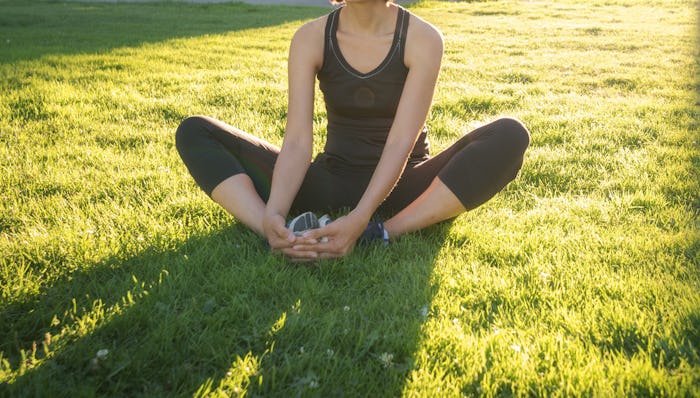Life
Apparently, Your Hips Can Say A Lot About Your Pelvic Health
When you think about the role your hips play in the way your body functions, you probably think about giving birth and alleged advantage of "childbearing hips." Or maybe you think about dancing ("hips don't lie") or even dieting ("a moment on the lips, an eternity on the hips"). One thing you probably don't think about, however, is the connection between your hip health and the well-being of the rest of your body. For example, what can your hips tell you about your pelvic health?
The thing about bones is, all of them are connected to other bones... which means that an issue with one bone or set of bones is probably going to affect another bone or nearby body part. (You remember the song: "The thigh bone's connected to the hip bone/The hip bone's connected to the back bone/The back bone's connected to the neck bone" and so on.)
Besides connecting all those bones to each other, your hips are super instrumental in making sure the pelvis does what it's supposed to do — and not just during childbirth, either.
"The muscles of your hips are really, really important when it comes to the function of your pelvic floor and preventing pelvic pain, pelvic organ prolapse and incontinence," Lisa Gillispie, a Restorative Exercise Specialist who specializes in hip and pelvic floor challenges, wrote on her website. When your hip muscles are too weak to support your pelvic floor properly, your risk of developing prolapse and/or incontinence is increased. Plus, an unstable pelvis can cause SI joint and pubic symphisis pain (a joint in the middle of the pelvis).
If you feel a stiffness in your hips a good portion of the time, this could signal a poorly functioning pelvic floor and weak glutes, Dr. Stephanie Mayer, a licensed physical therapist and certified health coach, explained on her blog. And unfortunately, stretching your hips alone won't make this stiffness go away.
"Stiffness is a sign of an injury somewhere else," Dr. Mayer added, and the only way to loosen your hips and keep them pain-free is to fix the underlying problem.
Just like the hip bone is connected to the pelvis bone, the hip muscles are directly attached to your pelvic floor muscles, according to the Carolina Pelvic Health Center. In particular, the pelvic floor muscles are connected to a certain hip muscle, called the obturator internus (OI).
As one of the six lateral rotators of your hip, the OI muscle helps the leg to rotate on the pelvis while staying stable. The pelvic floor muscles are a "hammock shaped group of muscles that support the bony pelvis and pelvic organs," helping us to maintain bowel and bladder control as well as sexual function.
That's why for some women, pelvic floor dysfunction (PFD) can show up as pain in areas besides the hips; specifically, the vulva, bladder, back, or abdomen. Even bowel disorders and endometriosis can be caused by PFD, though medical professionals sometimes fail to make the connection.
“Often, doctors treat symptoms in the affected organ or joint rather than find the real cause,” Amy Stein, a pelvic-floor physical therapist and author of Heal Pelvic Pain told Reader's Digest.
“They try to treat just the vulva pain, the constipation, or the hip joints. But when you miss the cause, you can’t really fix the problem.”
So if you're having hip pain or stiffness (particularly if it's accompanied by additional symptoms including a frequent urge to pee or a "heavy feeling" in the pelvis), it's worth trying to find a doctor who will take your symptoms seriously. There are treatments available, from medications to surgical procedures to physical therapy. So listen to your hips... besides the whole thing about not lying, your hips might be legitimately trying to help you out.
This article was originally published on
